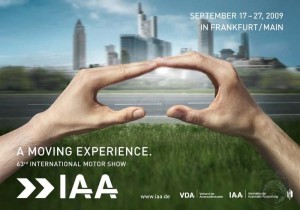 When the gates open at the Frankfurt Messe, earlier Tuesday morning, it will kick off two days of organized chaos.
When the gates open at the Frankfurt Messe, earlier Tuesday morning, it will kick off two days of organized chaos.
The biennial Frankfurt Motor Show, officially known as the 63rd IAA, is one of the world’s largest car shows – however you measure it: raw size, number of new product intros, public attendance or media coverage – and one of the most significant.
Indeed, the events of recent months will all converge at the sprawling conference center, which measures nearly a full kilometer from front to back, starting with last week’s news that General Motors will go ahead with plans to sell a 55% stake in its German-based Opel subsidiary.
Expect a lot of questions to be raised about the impact of that sale on the weakened U.S. maker’s long-term plans. In recent years, Opel had been playing an ever more critical role as a key product development center for GM, and whether that can continue with the parts supplier, Magna International, now the dominant stakeholder remains to be seen.
There’ll be a shadow hanging over the Messe, for Europe is facing many of the same economic problems as the United States, even if car sales haven’t tumbled quite so badly. It will be a critical stage for European manufacturers like Renault, Peugeot, Fiat and Mercedes-Benz, as they struggle to build back sales and hang onto share.
But they’ll be facing off with some aggressive foreign brands. Toyota, for example, will launch an array of new products and give a hint of more to come with concept vehicles like the LF-Ch, which is very likely to return, in production trim, under the Lexus badge.
The South Koreans, in particular, have placed a target on the European market. They’ve had a roller-coaster ride, over the years, but Hyundai is betting it can gain ground with an array of products, including a prototype of its first-ever hybrid, the ix-Metro, and a new battery car, the i10.
How green is my car fleet? That’s a key question that European makers are trying to answer with an assortment of concept and production vehicles, such as the BMW Vision, a prototype diesel-hybrid. Proposed European standards will sharply reduce CO2 emissions, and, in turn, mean big increases in fuel efficiency. But that’s going to be a tough challenge for luxury makers, with their big sedans and powerful engines, to meet. Not that the luxury makers intend to walk away from their traditional niches. Among the many high-line debuts, look for Mercedes-Benz to formally lift the wraps on the SLS supercar, and McLaren to unveil a pair of its own offerings.
American makers will be on hand, though most of what Ford will reveal will “focus” on its European line-up, with debuts to include a revised C-Max “people mover.”
Chrysler, meanwhile, will move its display over to the Fiat stand, acknowledging its new role as the American arm of the Italian maker. The show comes a little too soon for the two partners to unveil their Fiat-based product strategy, though Chrysler will tease European buyers with an updated version of a diesel-powered Caliber.
The maker with the most to win or lose will be Volkswagen, which is now Europe’s largest auto manufacturer – and giving good chase to Toyota, which last year nudged its way to the top, to become the world’s largest auto company. Among the many debuts by the various VW brands: an all-new version of the Passat. That sedan is likely to become a critical part of Volkswagen’s push to rebuild its market share in the United States.
Other VW brands will be busy, with plenty of new offerings from Audi, Skoda, Seat, Lamborghini, and Bentley – which will give the first technical details on the new luxury flagship, the Mulsanne, which TheDetroitBureau.com previewed in August. And look for a new member of the VW family. After a tough and costly battle, Porsche recently agreed to be taken over by the “People’s Car” company. It will unveil a new 911 Turbo.
The two-day Frankfurt Motor Show press days will be followed by the public days, and should provide a sense of whether German motorists are ready to return to the car market or sit on the sidelines waiting for better economic times. That, in turn, could send out a signal that will influence what happens in much of the rest of the world.
